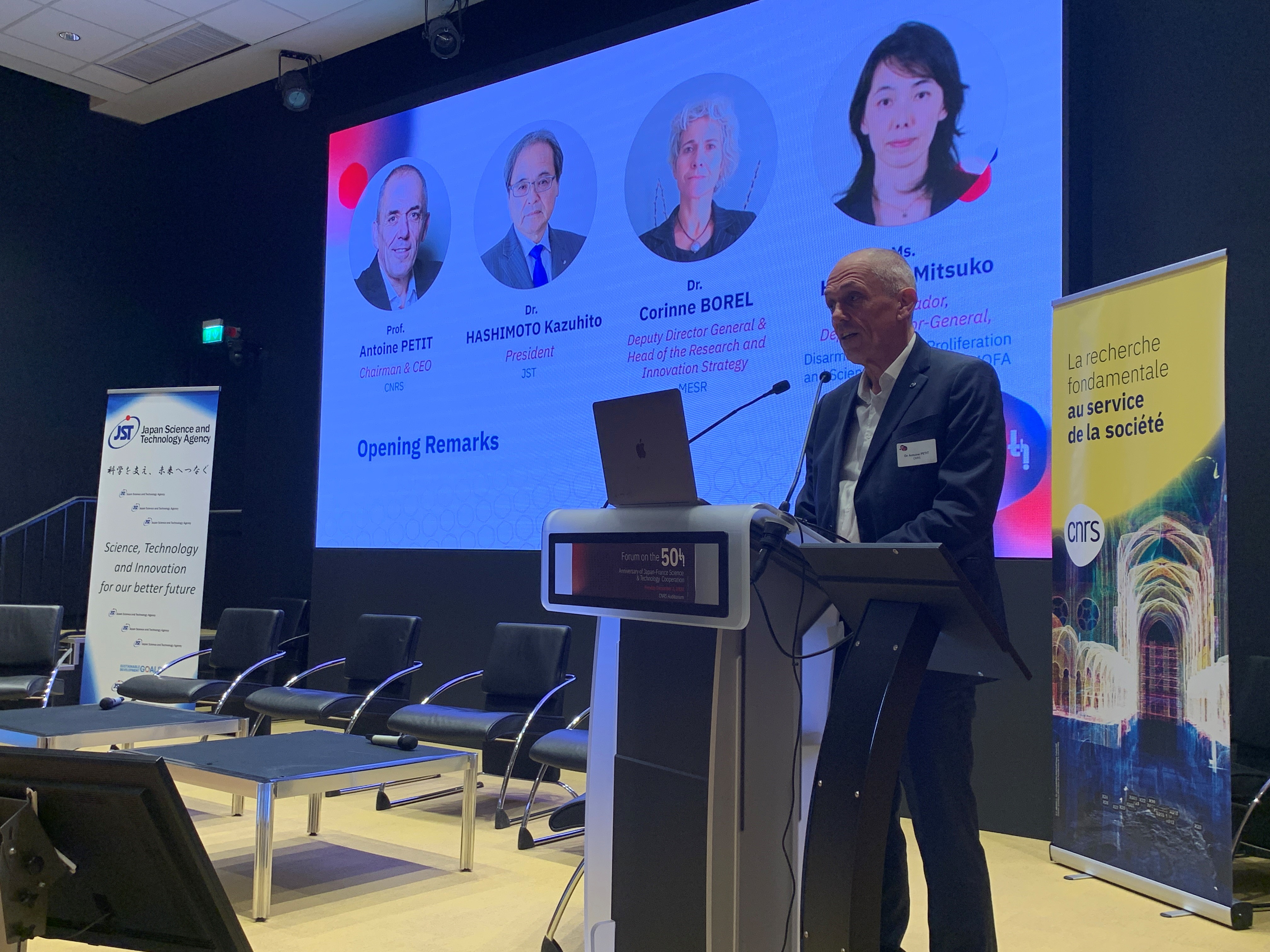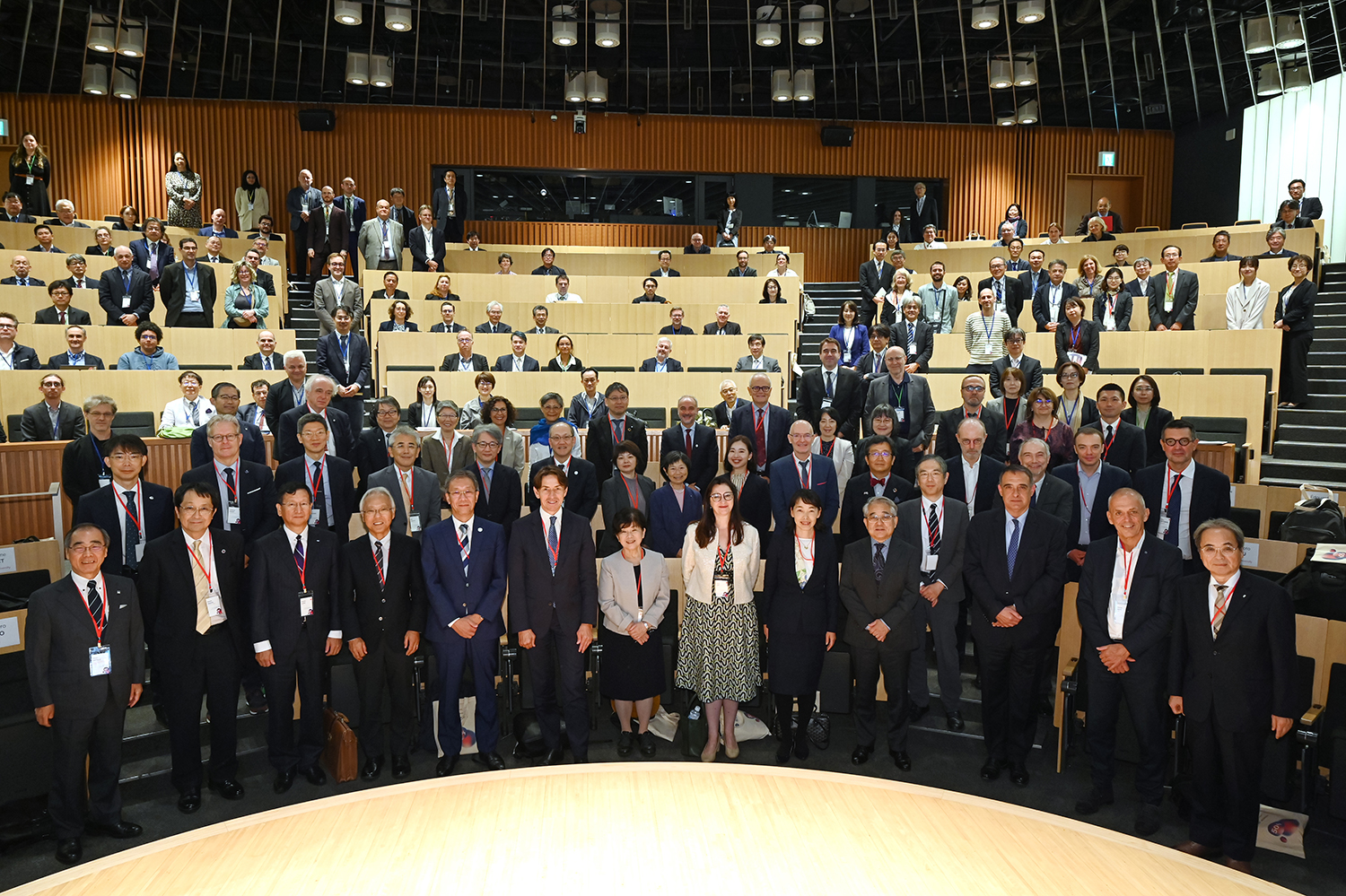The reasons behind this success of fifty years of Franco-Japanese scientific collaboration
On December 2nd 2024, the CNRS welcomed its Japanese partners to Paris to celebrate the fifty years of scientific cooperation between France and Japan. This is a model for international relations that looks like becoming even more robust in coming years.
On July 2nd 1974 a scientific cooperation agreement was signed by France and Japan. Fifty years later, the two nations have clearly become "exceptional partners", to use the phrase coined by a delighted Antoine Petit, Chairman and CEO of the CNRS, at the anniversary event held at the French research organisation's Paris head office on December 2nd of this year.
A model for international scientific cooperation
The speakers invited by the CNRS all agreed that scientific cooperation is a model for international relations. The exemplary value of the Franco-Japanese friendship above all derives from the quality and diversity of the research partnerships involved as the 'key figures' below explain. France is now Japan's fifth most important international partner for scientific co-publications and its third partner in Europe (behind Germany and the United Kingdom). Inversely, Japan is France's tenth most important international partner and the second Asian country, behind China. These cooperation projects are recognised at the highest level. In his speech on December 2nd, Jean-Pierre Sauvage, professor emeritus at the University of Strasbourg, thanked the many Japanese research teams that have enabled him to carry out his work on molecular machines for the last twenty years which earned him the 2016 Nobel Prize in Chemistry.
Another reason for the lasting nature of Franco-Japanese collaboration is the strong institutional support it benefits from. As Antoine Petit points out, "the quality of research with Japan is evident at both the individual and institutional levels". For the CNRS alone, "Japan has over 55 structuring projects1 which make it is our leading partner in terms of institutional collaborations" and serves as a guarantee for "long-standing, well-established relations", explains the French Chairman and CEO. However, although the CNRS accounts for 50% of Franco-Japanese joint scientific publications, the organisation is not the only French stakeholder in this multi-partner collaboration. This was reflected in the CNRS's invitations to the December 2nd event to the French National Research Agency (ANR), its Japanese counterpart the Japan Science and Technology Agency (JST) and several ministerial delegates from all over the world.
Donato Giorgi, the European and international affairs director for the French Ministry of Higher Education and Research (MESR) was among the guests. He notes that "the Franco-Japanese relationship is present at all levels of research – from students to funding agencies to laboratories – and it's going from strength to strength thanks to the political support it gets". This support includes a joint science, technology and innovation committee - a rare strategic structure that is only set up for France's closest partners. The reason for this is that France and Japan share common values that guide their research as well as scientific teams and projects. Corinne Borel, the head of the MESR'S research and innovation strategy department, stresses that these shared values are "democracy, open science, curiosity and academic freedom".
Reinforcing collaboration
To take this long-standing collaboration further, the Japanese participants followed the JST president Kazuhito Hashimoto's credo that the day should be not only be viewed as "a cause for celebration but also as a call to action to deepen our collaboration". Since Japan emerged from the Covid-19 pandemic the country has been making efforts to reinforce its position on the international scientific stage with very good reason – a 2023 ministerial study spotlighted the archipelago's serious competitiveness crisis. Hiroki Takaya is the Deputy Director General in charge of the Science & Technology Policy Bureau at Japan's Ministry of Education, Culture, Sports, Science and Technology. He lamented the fact that "in recent years, Japan has seen a stagnation in its science and technology capabilities, as indicated by data such as paper citations". In practical terms, this loss of momentum is reflected in "a decline in certain cutting-edge areas", notes Kazuhito Hashimoto with regret.
To push back against this downturn, Japan's scientific institutions have brought in a number of measures and programmes to boost the country's international competitiveness. These include the Aspire programme set up and overseen by the JST which funds the integration of Japan's scientists of all ages into the research networks of the major scientific nations – with Europe and the United States as leaders – and more specifically into strategic research fields. In other words, those of the JST president, "Aspire counters the brain drain and promotes international mobility that is mutually beneficial for both parties". Alongside Japan's own national programmes the country hopes to develop closer ties with Europe by joining Horizon Europe as an associate country as Canada, New Zealand and South Korea have done. As well as joining this European programme, Japan has initiated bilateral links with several countries including France. Indeed, France is the second-largest beneficiary in volume of number of projects accepted in the framework of the Japanese Society for the Promotion of Science's 'Core-to-Core' programme.
Japan's deliberate openness to international collaboration has created an encouraging context for French scientific institutions to establish themselves in the country. As France's leading research organisation, the CNRS has successfully responded to positive overtures made by its Japanese partners and increased the number of its institutional structures in the last few years. A few days before the fiftieth anniversary event in Tokyo held in October, the twelfth CNRS international research laboratory opened in Japan. The EARLY lab works on the study of the life cycle of fish in coral reefs in partnership with the Okinawa Institute of Science and Technology. There is a particularly strong dynamic in Tokyo with one of the CNRS's six international research centres run there in partnership with the country's leading university, the University of Tokyo. Since the centre's launch in 2022, a new international research laboratory in mathematics has been set up while others are set to follow the same path thanks to the efforts of joint working groups involving the two institutions.
Clearly then, at fifty years young, Franco-Japanese cooperation led by the CNRS is still very much in its youth and looking to the future with serenity.
Notes
- International research centres, laboratories, research projects and networks and emerging international actions.


